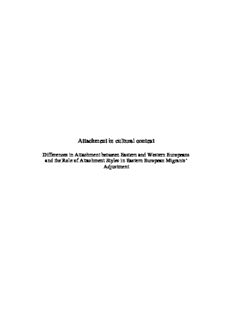
Attachment in cultural context differences in attachment between Eastern and Western Europeans and the role of attachment styles in Eastern European migrants' adjustment PDF
Preview Attachment in cultural context differences in attachment between Eastern and Western Europeans and the role of attachment styles in Eastern European migrants' adjustment
Attachment in cultural context Differences in Attachment between Eastern and Western Europeans and the Role of Attachment Styles in Eastern European Migrants’ Adjustment ISBN-978-90-367-3306-9 © 2007, Elżbieta Polek No part of this publication may be reproduced in any form, by print, photoprint, microfilm, or any other means without written permission from the author, except in the case of quotations in reviews, articles, books etc. The present research was founded by the Ubbo-Emmius Foundation of the University Groningen Printed by Grafex The author can be reached through email: [email protected] RIJKSUNIVERSITEIT GRONINGEN Attachment in Cultural Context Differences in Attachment between Eastern and Western Europeans and the Role of Attachment Styles in Eastern European Migrants’ Adjustment Proefschrift ter verkrijging van het doctoraat in de Gedrags- en Maatschappijwetenschappen aan de Rijksuniversiteit Groningen op gezag van de Rector Magnificus, dr. F. Zwarts, in het openbaar te verdedigen op donderdag 24 januari 2008 om 14.45 uur door Elżbieta Polek geboren op 3 juli 1974 te Olsztyn, Polen Promotores: Prof. dr. J.P.L.M. van Oudenhoven Prof. dr. J.M.F. ten Berge Beoordelingscommissie: Prof. dr. B. de Raad Prof. dr. R. Goodwin Prof. dr. P.L.C. van Geert Contents Preface and acknowledgements 1 Chapter 1: Introduction 5 Chapter 2: Evaluating the Replicability of the Bartholomew and Horowitz Model of Attachment in one Native Dutch and Four Immigrant Samples 15 Chapter 3: Attachment Styles and Demographic Factors as Predictors of Sociocultural and Psychological Adjustment of Eastern European Immigrants in The Netherlands 35 Chapter 4: Evidence for a “Migrant Personality”: Attachment Styles of Poles in Poland and Poles in The Netherlands 49 Chapter 5: A Cultural Look at Parenting and Attachment Styles in Eastern and Western Europe 63 Chapter 6: Discussion and Implications 83 Summary 94 References 100 Appendix 121 1 Preface and Acknowledgments The present research was conducted with the help of many people. I would like to thank some of them for their support. First and foremost, I am very grateful to my supervisors – Professors Jan Pieter van Oudenhoven and Jos ten Berge for their great contribution to this dissertation and to my development as a researcher. When being supervised by them, I also had an opportunity to co-supervise the work of Joachim Wöhrle, whom I would like to thank for an inspiring exchange of ideas, his help in data-entering and his sense of humor. Our cooperation truly established a new era in Polish- German relations. I wish to thank all the respondents who participated in my surveys, my colleague, Jacomijn Hofstra, for access to the data from the Dutch sample used in chapters 2 and 4, Veerle Brems, for collecting the data from the Dutch parents used in chapter 5, Naima El-Boundati, for collecting data from the Moroccan sample used in chapter 2, and Anna Szewczyk, for helping to collect the data from Polish parents used in chapter 5. Special thanks go to my Hungarian friends - Tamás Bíró and Andrea Szentgyörgyi, for translating questionnaires and their help in the survey in Budapest. Katia Kalinina – thank you for Russian translations and helping me in St. Petersburg. Also I would like to thank Pr. Sławomir Trypuć and Bartłomijej Małys, and Mrs. Małgorzata Bos-Karczewska for their help in data collection from Polish immigrants in the Netherlands. Many thanks to my roommates – Jacomijn, Ester, and Irene and other colleges from DPMG, especially Jorge, Rink, Arnaud, and Ilse; Hanny Baan, the secretary of our department who always swiftly handled my requests, and the ever kind and competent librarians, portieres and staff of the “Repro”, who printed the hundreds of questionnaires used in this project. I would like to thank my dear friends and colleagues who made my stay in Groningen memorable: Koen van Breackel, Yorgos Vleioras, Carmen Carmona, Huadong Yang, Anna Lichtwark, Laura Ballato, Simon Dalley, István Back and my fantastic housemate – Paco Guzman-Muñoz. Thanks to Magda Gołachowska and Kacper Wojtal, I didn’t forget Polish language; Dimitry – Balshoje spasiba za razgavory! Hartelijk dank to Pieter van Hoek for our wonderful talks about life and philosophy and for debriefing me about Dutch politics. Many thanks to Max Nuijens for supporting me when I really needed it. I am thankful to Anne Boomsma, for being not only a knowledgeable professor, but also a wise person, and AIO-advisor Dr. Jose Heesink, for her help, as well as many other people for their support. Please forgive me for not mentioning all of your names individually. I am also obliged to Ela & Romek Mizera for their generous support, Leszek Wołejko for a “technical support”, Luc Wasungu and Joanna Tadzik for all the good things I experienced from them. Finally, I would like to say thank you to Benjamin Cope, who did a proofreading of this thesis. Credit and thanks for the successful completion of my Ph.D. project I happily share with all these people. I dedicate this dissertation to my mom and dad, and Krzysztof, my wonderful brother. 3
